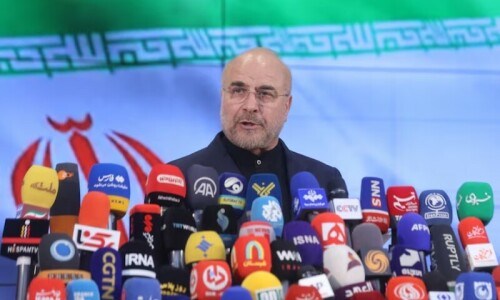IN many discussions about population planning in Pakistan, a debate arises about individuals’ rights to decide on their own reproduction against the responsibility of the state to plan for the whole of society. In this vein, the perception of what Pakistan society accepts and what is considered sensitive in the context of reproductive rights is always subject to misconceptions, even myths. In this article, I gather different ingredients to tell a human story that speaks to the situation in Pakistan for the sake of a more comprehensive and coherent analysis.
No doubt all human beings are born equal and therefore entitled to the same rights. How countries organise themselves to ensure the people enjoy their human rights and how fast and far they go is debatable and can be manoeuvred within the context of local circumstances.
Reproductive rights originated as a subset of human rights at the UN’s 1968 International Conference on Human Rights; these rights rest on the recognition of the basic right of all to decide freely and responsibly the number, spacing and timing of their children and to have the information and means of doing so, and the right to attain the highest standard of sexual and reproductive health. The decisions concerning reproduction must be free of discrimination, coercion and violence. Reproductive rights involve three components: family planning, sexual health and maternal health.
The right to reproductive choice means that women have the right to choose whether to reproduce and their preferred method of family planning and contraception. However, the right of a woman to decide whether to carry or terminate an unwanted pregnancy often becomes debatable. Logically, women opt for abortion mostly when they get pregnant unintentionally or coercively. Therefore, expanding and scaling up the availability and accessibility of family planning methods, and enforcing bodily autonomy reduces the need for abortion and saves lives.
Bodily autonomy means that a woman’s private life is not a public affair.
UNFPA zooms its intervention on abortion from a maternal health perspective, according to its mandate by member states, to ensure that every pregnancy is wanted, and every childbirth is safe. As countries have different legal standing points regarding the legality of terminating a pregnancy, UNFPA focuses its role on the safety and well-being of women. It does not promote changes to the legal status of abortion, which is the sovereign preserve of countries. It is worth noting that UNFPA does not support or promote abortion as a family planning method; on the contrary, UNFPA advocates the use of high-quality modern family planning methods to reduce unintended pregnancies, and consequently, reduce unsafe abortions. Further, it opposes any coercive abortion and the discriminatory practice of prenatal sex selection from the perspective of the right of choice and gender equality.
Bodily autonomy means the right to make decisions regarding one’s own life and future. It is a right to be empowered and free from violence. Collective decision-making is common across cultures, societies and governments, although it cannot circumscribe the rights of individuals. Bodily autonomy means that a woman’s private life is not a public affair; no one must make decisions on her behalf about her body and the choices she would want to make.
There is a myth about bodily autonomy that one person’s bodily autonomy could end up undermining the autonomy of others. The fact is that respect for bodily autonomy is a core tenet of international medical ethics. Thus, within the responsibilities of an individual’s values, cultural and religious duties, and beliefs, for example, they have the sole right to make a responsible choice. No one should have the right to violate anyone else’s rights, autonomy or bodily integrity.
A myth is that bodily autonomy undermines traditions and religions, but the fact is that it is about a person’s whole life, dreams and potential. Also, bodily autonomy is about choices, and all religions value free and responsible choices.
Reproductive rights consist of three broad categories; the first is reproductive self-determination; therefore, family planning is not a tool in the hands of the state to control births; it is a duty of the state towards the right holders to enable individuals to choose freely and responsibly if they want to have children, how many, and how to space them. The second category speaks to the right to sexual and reproductive health services, information and education. This is, again, a service provided by the state to enable the right holders to make informed decisions about their bodies. The third group is about the rights to equality and non-discrimination.
In a nutshell, what matters is rights; all people everywhere are equal and entitled to the same human rights.
The writer is representative of UNFPA in Pakistan.
Published in Dawn, June 21st, 2023










































Dear visitor, the comments section is undergoing an overhaul and will return soon.